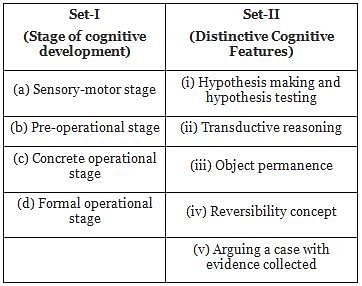CTET Paper 2 Mock Test - 4 (Social Science) - CTET & State TET MCQ
30 Questions MCQ Test CTET (Central Teacher Eligibility Test) Mock Test Series 2024 - CTET Paper 2 Mock Test - 4 (Social Science)
For which of the following trial and error method is more useful?
Which of the following may be the criteria of gender parity in a society?
| 1 Crore+ students have signed up on EduRev. Have you? Download the App |
Which of the following is not a learning method?
Innovative way of problem solving is mostly observed in which of the following types of learning?
While teaching a single parent child, a teacher should
A child is not suitable to learn a task properly because of non-attainment of age. The learning factor involved is
Which of the following statements is correct?
The memory traces formed in the mind are called
Which of the following does not belong to the category of coping strategies, that women are commonly engaged in?
In the following two sets of information, Set-I mentions the stages of cognitive development as given by Piaget and Set-II specified the distinctive cognitive features:

Match the two sets and indicate your answer from the options given below:
Which of the following are the major socialization agencies?
I. Community
II. Family
III. Same group
IV. Formal educational institution
According to Jean Piaget, preoperational children are
According to Lev Vygotsky, the primary cause of cognitive development is:
According to Lev Vygotsky, Learning can be categorized under what kind of activity?
Which statement is true about the Post conventional morality stage of Kohlberg?
Which of the following observations supports Howard Gardner’s theory of multiple intelligence?
According to Vygotsky, child’s language and thought develop __________.
A School gives preference to boys while selecting students for cooking competition and to girls for badminton competitions. This indicates -
Children in _______ stage have symbolic thinking but do not realize that actions can be reversed and their judgments are based on the immediate appearance of things.
According to Vygotsky, the upper limit of tasks that a learner can successfully perform with the assistance of a more competent individual is termed as:
In which stage, does the tendency of children to explore new and move around greatly increase?
According to the principles of motivation, a teacher promotes learning through?
Assertion (A): Inclusive education can help reduce social stigmas associated with disabilities.
Reason (R): By integrating students with special needs, inclusive education promotes acceptance and understanding among peers.
Assertion (A): Gathering feedback is a crucial step in problem-solving processes.
Reason (R): Implementing decisions without feedback can lead to ineffective solutions.
Assertion (A): Individuals with high scores in the trait of "Self-reliance" are more likely to exhibit independent behavior.
Reason (R): Self-reliance denotes a tendency towards self-sufficiency rather than dependency on others.
Assertion (A): Early infantile laughter typically emerges around 3 to 4 months after birth.
Reason (R): Laughter in infants is an important social cue, indicating joy and engagement.
Assertion (A): Stressful family environments can negatively impact a child's learning abilities and emotional development.
Reason (R): Children in stressful family environments often experience difficulties in forming healthy emotional bonds and may struggle with learning disabilities.
|
178 docs|90 tests
|
|
178 docs|90 tests
|

















